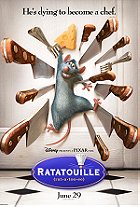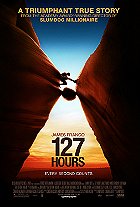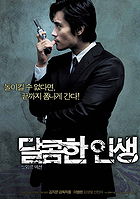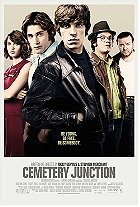With the Hollywood remake machine surging through European countries unabated, none shall be spared, with Let the Right One In and now The Dinner Game having been reinvented for Westerners. By and large, remakes of this variety are completely unnecessary as they are merely produced to ensnare audiences who are resistant to embrace foreign films in their original form (i.e. with subtitles). It's surprising, then, that Dinner for Schmucks is in fact a constantly uproarious comedy benefitting from an ideal cast. However, it's not perfect. A Hollywood remake of the French film The Dinner Game, Dinner for Schmucks features a mean-spirited premise which should have paved the way for a hysterical black comedy. Instead, the film is too soft and formulaic, not to mention overlong at about 110 minutes. If edited down to 80 or 90 minutes and if it was armed with an edgier script, Dinner for Schmucks could've been one of the highest comedic points of 2010. Luckily, there's nonetheless a lot to enjoy here.

At the centre of the story is Tim Conrad (Rudd); a morally conflicted but well-meaning financial analyst on the verge of receiving an important promotion. During his daily work meeting, he impresses his boss (Greenwood) by pitching an idea involving rich a Swedish magnate (Walliams) which could bring big profits to the investment firm. In order to further prove himself to his boss, Tim is invited to a secret monthly dinner in which the top brokers bring along the funniest idiot they can find and spend the evening making fun of their guests. Inwardly, he's against the idea - so, too, is his girlfriend Julie (Szostak) - but then fate drops a huge idiot named Barry (Carell) into Tim's life. A lonely IRS employee who screws up any situation with his earnest behaviour and who creates dioramas with dead mice, Barry is the perfect choice for the gathering of morons. However, Barry is so overexcited by the dinner invite that he shows up to Tim's apartment a full day early and subsequently ruins every facet of Tim's life.
To the credit of those behind Dinner for Schmucks, the film kicks off with one of the most endearing opening credits sequences you will ever see - a montage of Barry building his dioramas with stuffed dead mice; showing the rodents in miniature play-lands as they indulge in love and whimsy. The brilliant Beatles song The Fool on the Hill plays over this sequence, and it's a pitch-perfect way to open the movie.

Dinner for Schmucks serves up plenty of laughs and a sufficient amount of heart, but it's never as cutting or as dark as it should have been. In fact, this could be the safest mean-spirited comedy in history. Although it initially seems that the film is headed for dark comedy territory, it eventually settles into the groove of a middle-of-the-road screwball comedy. Moreover, the final act lays on the moral backbone stuff a little too thickly; playing to a generic studio agenda. The "warm, fuzzy" feeling this generates ultimately undermines the potential for Dinner for Schmucks to be a brilliant black comedy. Additionally, the tone is rather schizophrenic as we're encouraged to laugh at the idiots while also feeling bad for them. Thus, the filmmakers were less interested in alienating viewers with excessive cruelty than they were in taking the characters along a familiar journey for which every single plot point is predictable.
Prior to Dinner for Schmucks, director Jay Roach had been responsible for two highly successful comedy franchises: the Austin Powers movies, and Meet the Parents and its first sequel. Once again, Roach demonstrated here why he is one of the best comic directors in the business. Roach has a gift for comic timing and is deft at endowing his projects with energy. While it's at times slow, the film is constantly enjoyable nonetheless. The film's primary asset is the relatively unpredictable ridiculousness - you will never know what Barry-created disaster will befall Tim next. And the actual climactic dinner sequence is hilarious. Dinner for Schmucks is a very funny movie, though some of the humour is derived from awkward situations that will make you cover your eyes and feel uncomfortable. Not all of the uncomfortable comedy works, but, when it does, it's hilarious.

In the film, Rudd plays his umpteenth straight man, yet he suits the role. However, the true star of Dinner for Schmucks is Steve Carell, who's pure magic as Barry. The star managed to make the role so simultaneously likable, infuriating, brave and pathetic. On top of this, Carell struck the right balance between childlike innocence and full-on obnoxiousness which was so integral to making the character work. Zach Galifianakis (The Hangover) also features here as a bearded weirdo who claims to be able to control people's minds. Fittingly, Galifianakis is the only performer who comes close to topping Carell. Watching Carell and Galifianakis square off is pure genius. In addition, there's an amusing Jemaine Clement as a self-absorbed artist, and comedian Jeff Dunham as a ventriloquist (how suitable) who attends the titular dinner. Meanwhile, Lucy Punch (Hot Fuzz) is sinfully funny in the go-for-broke role of Darla; a former one-night stand of Tim's who is completely obsessed with him and is keen to rekindle what she perceives as a flame. And to round out the most notable members of the cast, David Walliams is a total riot as the wealthy Swedish magnate.
David Guion and Michael Handelman's script for Dinner for Schmucks had great potential to go further with the dark comedy, but somewhere along the line it was decided to keep the proceedings light and PG-13 to allow for maximum box office profits. However, it's saved by an inspired cast, most notably the show-stealing Steve Carell. Without Carell, Dinner for Schmucks would have been just another abysmal Hollywood attempt at remaking a foreign film for Westerners. But with Carell, the film is exceedingly watchable and constantly hilarious.
6.1/10
 Login
Login
 Home
Home 183 Lists
183 Lists 1671 Reviews
1671 Reviews Collections
Collections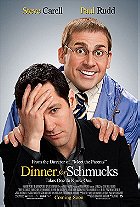
 0 comments,
0 comments, 